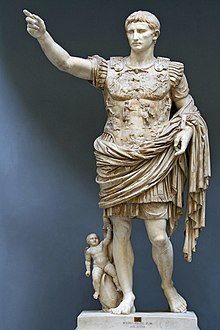Gaius Octavius Thurinus
| Augustus | |||||
|---|---|---|---|---|---|

Augustus of Prima Porta, 1st century
|
|||||
| Emperor of the Roman Empire | |||||
| Reign | 16 January 27 BC – 19 August AD 14 (40 years) |
||||
| Predecessor |
Julius Caesar As Dictator of the Roman Republic |
||||
| Successor | Tiberius | ||||
| Born | Gaius Octavius Thurinus 23 September 63 BC Rome, Roman Republic |
||||
| Died | 19 August AD 14 (aged 75) Nola, Italia, Roman Empire |
||||
| Burial | Mausoleum of Augustus, Rome | ||||
| Spouse |
|
||||
| Issue | Julia the Elder | ||||
|
|||||
| House | Julio-Claudian dynasty | ||||
| Father |
|
||||
| Mother | Atia Balba Caesonia | ||||
| Religion | Traditional ancient Roman religion | ||||
| Full name | |
|---|---|
| Imperator Caesar Divi Filius Augustus |
| Roman imperial dynasties | |||
| Julio-Claudian dynasty | |||
| Chronology | |||
| Augustus | 27 BC – 14 AD | ||
| Tiberius | 14–37 AD | ||
| Caligula | 37–41 AD | ||
| Claudius | 41–54 AD | ||
| Nero | 54–68 AD | ||
| Family | |||
|
Gens Julia Gens Claudia Julio-Claudian family tree Category:Julio-Claudian dynasty |
|||
| Succession | |||
|
Preceded by Roman Republic |
Followed by Year of the Four Emperors |
||
Augustus (Latin: Imperātor Caesar Dīvī Fīlius Augustus; 23 September 63 BC – 19 August 14 AD) was a Roman statesman and military leader who served as the first Emperor of the Roman Empire, controlling Imperial Rome from 27 BC until his death in AD 14. His status as the founder of the Roman Principate has consolidated an enduring legacy as one of the most effective and controversial leaders in human history.
He was born Gaius Octavius Thurinus into an old and wealthy equestrian branch of the plebeian gens Octavia. His maternal great-uncle Julius Caesar was assassinated in 44 BC, and Octavius was named in Caesar's will as his adopted son and heir, then known as Octavianus (often anglicized to Octavian). He, Mark Antony, and Marcus Lepidus formed the Second Triumvirate to defeat the assassins of Caesar. Following their victory at the Battle of Philippi, the Triumvirate divided the Roman Republic among themselves and ruled as military dictators. The Triumvirate was eventually torn apart by the competing ambitions of its members. Lepidus was driven into exile and stripped of his position, and Antony committed suicide following his defeat at the Battle of Actium by Octavian in 31 BC.
...
Wikipedia
